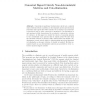238 search results - page 29 / 48 » On the Modularity of Theories |
Book
"These course notes are addressed to a wide audience of people interested in modern programming languages in general, ML-like languages in particular, or simply in OCaml, whet...
LFCS
2009
Springer
14 years 2 months ago
2009
Springer
Canonical propositional Gentzen-type calculi are a natural class of systems which in addition to the standard axioms and structural rules have only logical rules where exactly one ...
HASKELL
2009
ACM
14 years 2 months ago
2009
ACM
It is common for compilers to derive the calling convention of a function from its type. Doing so is simple and modular but misses many optimisation opportunities, particularly in...
LICS
2007
IEEE
14 years 1 months ago
2007
IEEE
Abramsky’s logical formulation of domain theory is extended to encompass the domain theoretic model for picalculus processes of Stark and of Fiore, Moggi and Sangiorgi. This is ...
TLCA
2007
Springer
14 years 1 months ago
2007
Springer
Initial algebra semantics is a cornerstone of the theory of modern functional programming languages. For each inductive data type, it provides a fold combinator encapsulating struc...

